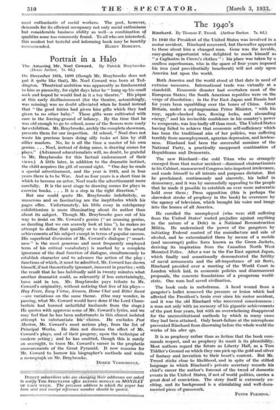The 1940's
Rinebard. By Thomas F. Tweed. (Arthur Barker. Vs. 6d.)
IN 1949 the President of the United States was involved in a motor accident. Rinehard recovered, but thereafter appeared to those about him a changed man. Gone was the lovable, easy-going opportunist who delighted to mock himself as Cagliostro in Cicero's clothes " : his place was taken by a soulless superhuman, who in the space of four years imposed his iron (and providentially beneficent) will not only upon America but upon the world.
Both America and the world stood at that date in need of extreme measures. International trade was virtually at a standstill. Economic disaster bad overtaken most of the
European States ; the South American republics were on the verge of dissolution ; in the Far East Japan and Russia had
for years been squabbling over the bones of China. Great Britain, under a septuagenarian Prime Minister, " with his rosy, apple-checked face, flowing locks, and abounding energy," and his invincible confidence in his country's power to recuperate, was less badly off than most. The United States having failed to achieve that economic self-sufficiency which
has been the traditional aim of her policies, was suffering terribly from unemployment, agrarian depression, and lawless- ness. Rinehard had been the successful nominee of the National Party, a practically unopposed combination of Republicans and Democrats.
The new Rinehard—the cold Titan who so strangely emerged from that motor accident—dismissed obstructionists in his Cabinet, manoeuvred Congress into impotent irrelevance, and made himself to all intents and purposes dictator. But he proclaimed, continuously and sincerely, his belief in democracy, and it was by successfully appealing to the people that he made it possible to establish an ever more autocratic hold over them ; Press opposition (this is perhaps the shrewdest stroke of prophecy in the book) he overcame by the agency of television, which brought his voice and image into the homes of all America.
He enrolled the unemployed (who were still suffering from the United States' rooted prejudice against anything
in the nature of a Dole) in a National Reconstruction
Militia. He undermined the -power of the gangsters by initiating Federal control of the manufacture and sale of ' alcohol, and he exterminated them by means of a mobile (and uncorrupt) police force known as the Green Jackets,
deriving its inspiration from the Canadian North West
Mounted Police. After a war in-the Far East against Japan, which finally and sensationally demonstrated the futility of naval armaments and the all-importance of air fleets, Rinchard presided over a meeting of the World Court in London which laid, in economic policies and disarmament proposals,. the concrete foundations of a prosperous world- state. One man had saved civilization.
The book ends in melodrama. A head wound from a gangster's bullet removed the pressure or lesion which had affected the President's brain ever since his motor accident, and it was the old Rinehard who recovered consciousness : a roan not only'with no memory of his gigantic achievements of the past four.ye,ars, but with an overwhelming disapproval for the unconstitutional methods by which in many cases they had been attained. Only heart-failure at the microphone prevented Rinehard from disowning before the whole world the works of his alter ego.
It is as prophecy rather than as fiction that the book com- mands respect, and as prophecy its merit is its plausibility. Most authors regard the future as Liberty . Hall, as a Tom Tiddler's Ground onwhich they can pick up the gold and silver of fantasy and invention to their heart's content. But Mr. Tweed sticke' close to likelihood, and in spite of the stilted language in which Rinehard's private secretary records his chief's career the author's forecast of the trend of domestic events in the United States, if not of world politics, carries a great deal of conviction. The story itself is extremely ex- citing, and its `background is a stimulating and well-docu- mented piece of guesswork.
• -PETER /FLEMING.'


















































 Previous page
Previous page